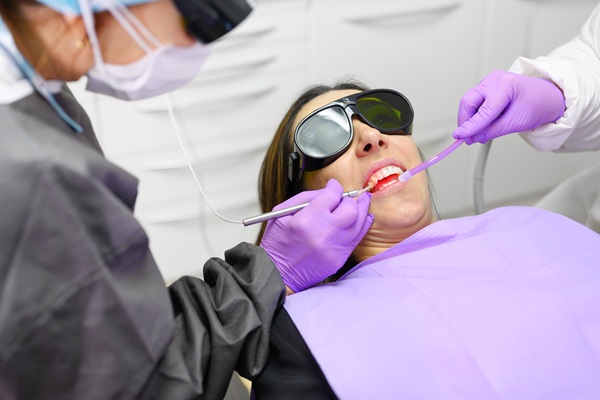How Does a Dentist Use Laser Dentistry for Dental Cleaning?

Laser dentistry is a relatively young concept that can target diseased soft tissue and improve the health of gums, jawbone, and more. Dental lasers are approved by the Food and Drug Administration (FDA), and the risks of the procedure are minimal. Subsequently, dentists often recommend laser dentistry for deep dental cleaning procedures.
Laser dentistry and dental cleaning
A routine dental cleaning removes plaque and tartar build-up along the gum line and on the surface of teeth. A deep dental cleaning actually cleans below the gum line. Traditional methods of deep dental cleaning can cause discomfort, and laser dentistry offers a way to minimize the pain and recovery time for a deep dental cleaning procedure.
What is laser dentistry?
Laser dentistry is an alternative method of dental treatment that uses highly focused light energy beams to remove or reshape tissue, bone, and more. Laser dentistry is a safe and effective alternative for patients that do not like the sound and feel of dental drills and other instruments.
How is laser dentistry used for dental cleaning?
As mentioned, laser dentistry is used for deep dental cleaning more than it is used for regular dental cleanings. During the procedure, the dentist uses dental lasers to target and remove plaque and tartar build-up along and beneath the gum line. This is done without harming any healthy gum tissue and without causing the gums to separate from the teeth.
Laser dentistry vs. traditional methods
Laser dentistry for dental cleanings does not require the use of any dental tools other than the FDA-approved dental lasers. This means there is no need for the more invasive dental tools often used with traditional methods, such as dental drills. This procedure also does not cause much, if any, discomfort, whereas traditional methods are much more likely to cause swelling, pain, and bleeding.
Is laser dentistry safe?
As mentioned, the use of laser dentistry for dental cleanings is approved by the FDA. Dentists also go through extensive training to help ensure the optimal safety and effectiveness of the procedure. Subsequently, the risks of deep dental cleaning with laser dentistry are minor, and most patients do not experience any adverse effects. In fact, the opposite is often true. Many patients report less discomfort and faster healing times with laser dentistry.
How to keep teeth and gums clean after your cleaning
Patients can protect their teeth and gums by brushing and flossing regularly after a dental cleaning. Regular visits to the dentist for routine cleaning are also highly encouraged, along with making smart dietary choices, such as avoiding foods and drinks that are high in sugar and other carbohydrates.
Schedule a visit for a laser dentistry dental cleaning
If you still have questions about laser dentistry or would like to schedule a visit for a dental cleaning either with lasers or through traditional methods, then reach out to our dental practice today. We are glad to answer your questions and help you decide on the best treatment option for you.
Request an appointment here: https://www.britesmiles4u.com or call Olga Kandov, DMD - Brite Smiles at (215) 330-5212 for an appointment in our Doylestown office.
Check out what others are saying about our dental services on Yelp: Laser Dentistry in Doylestown, PA.
Related Posts
Patients often search for root canal treatment when a tooth aches from deep decay, a crack, or inflamed pulp tissue. This therapy removes irritated nerve tissue, disinfects the canal space, and seals the tooth to prevent reinfection. By preserving the natural root, the procedure maintains bite balance and chewing strength. With careful planning, a restored…
Dental implant restoration is a reliable and long-lasting solution for replacing missing teeth. However, caring for and maintaining your dental implant from the start is important to get the best results. A consistent oral hygiene routine and regular dental visits are necessary to protect this investment in your long-term oral health.Brushing and flossing are essential…
Whether you are about to book an appointment for tooth implants or you have just undergone the procedure, you probably want to learn proper aftercare to ensure healing and recovery. One of the questions that patients often ask is what and what not to eat after surgery. Although placing implants ensures that you have dental…
Deep dental cleaning is a way to treat severe cases of gum disease. However, it is not always necessary for all cases of gum disease. By understanding when and why a dentist recommends a deep dental cleaning, you can feel more comfortable throughout the consultation and treatment process. Every dentist utilizes deep dental cleaning differently and…
